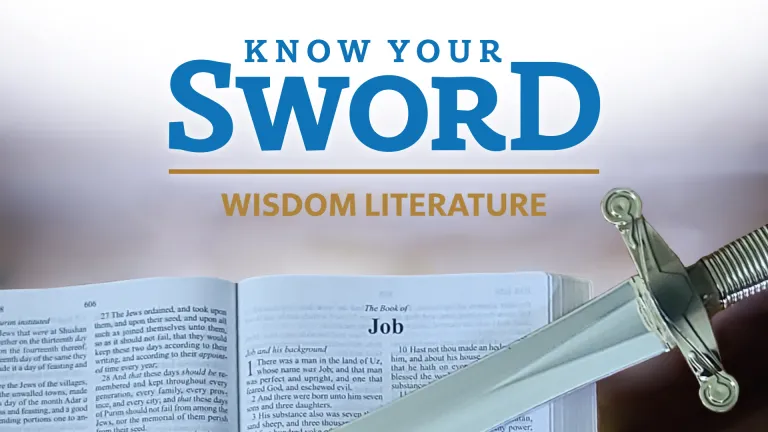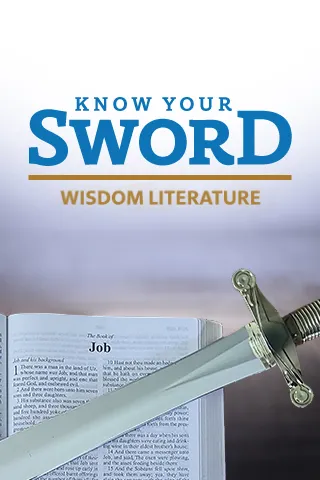Wisdom Literature Part 03

Human wisdom is on full display as we consider the words of Job’s wife and friends. Their well-intentioned words were found wanting when working out God’s intent for Job’s affliction.
Job’s patience and faith is struggling as he turns to despondency and depression, responses not uncommon with those who experience trauma and loss. In Job 3, his human thought processes are eloquently on display as he laments the day he was born and despairs of life itself. Given the grief and pain he is experiencing, he figures he would have been better off having been still born and longs to die. In the last verse of chapter 3, he indicates that all he has feared has come upon him and he does not see an end to his troubles, adding to his despair.
In the following chapters 4-37, we read of the application of human wisdom and understanding applied to Job’s situation. In a series of eloquent speeches from his friends, thoughts are shared in an attempt to provide objective perspective.
Job’s three friends
Job’s lament leads his three friends to finally speak and respond to Job.
Ernest C. Lucas (119) states: “Each assert in his own way that God is just and so rewards the righteous and punishes the wicked. [That’s true!] It therefore follows, in their view [Here’s where his friends go wrong.], that suffering is evidence of wrongdoing, and that the remedy is confession of sin and repentance. . . each supports this belief in a different way.”
In other words, his three friends are convinced that Job has committed a truly terrible sin, and he needs to repent! They are most confident that they understand wisdom and God’s way.
Eliphaz
Eliphaz may be the oldest since he speaks first. He’s not harsh in his words to Job; he shows Job more consideration and respect than the other two, but he insists that the righteous never come to an untimely end. He sees Job as a pious man gone astray (Expositor’s 859).
- Job 4:7-9. Eliphaz says, "Remember now, who ever perished being innocent? Or where were the upright ever cut off?" (v. 7). He sounds wise and correct, but is he?
- Job 5:17-19, 24-27. He exhorts Job to repent for the righteous (which he assumes Job cannot be!) will be delivered. True words but do they fit Job’s situation? He thinks so!
- Query: Are the innocent ever cut off? Do the righteous ever suffer? Is Eliphaz correct?
Bildad
Bildad asserts that Job’s catastrophe is due to his sin and the sin of his children (Lucas 119). He “warns Job that he will receive the same fate [death] unless he gets right with God” (Expositor’s 859). Bildad considers Job’s questioning and protesting of the justice of God as blasphemy. In essence, he tells Job that he and his family got what they deserved! OUCH!
- Job 8:2-6, 20. He tells Job that he is not upright, not blameless! Job says he is (9:21-22).
- What did God say? (Job 1:8; 2:3, twice!) Perhaps it is not Bildad’s place to condemn Job!
Zophar
Zophar denounces Job as one who mocks God (Expositor’s 859). He has an inflexible view of God. Thus, Job’s “suffering must be evidence of God’s displeasure. Indeed God is probably letting him off lightly. If Job will confess and repent, he will be restored” (Lucas 119).
- Job 11:5-6, 13-20. (verse 6ab, ironically, God will show Job the secrets of wisdom!)
- He bluntly tells him to repent or die the horrible death that the wicked deserve!
Job’s friends reveal their wrong approaches:
- They speak forcefully because they assume to know God’s justice and His mind, but they don’t fully grasp God’s mind, purpose or His ways. Could they be more humble?
- Though some of their wisdom is true, their wisdom is not necessarily true for Job.
- They apply wisdom in a rather shallow and simplistic way, such as the “retribution principle” (still around today).
- Idea of “You get what you deserve:” If you receive blessings, you’ve done “good;” if you receive curses, you’ve done “wrong.”
- Idea is not upheld by Scripture: What about suffering of Christ? Of Paul? etc.
- John 9:3 Jesus’ words about the man born blind at birth.
- 1 Peter 3:17, “For it is better . . . to suffer for doing good than for doing evil.”
Job’s friends had wrong conclusions:
- Since he claims to be blameless before God, they think Job is proud, self-righteous.
- Since he suffers so terribly, they think Job is not a blameless and innocent man.
- Since he refuses their advice to repent, they think Job has committed terrible sins.
- Since God has not struck them with curses, they are right and Job is wrong.
These three friends will continue to give Job the same advice but with increasing vexation toward Job as their dialogue continues.
Elihu’s monologue to Job, Job 32-37.
Job 32. We now hear from Elihu, a younger man whom we had not known was among Jobs’ friends. He has waited to speak until his elders have exhausted their words of counsel.
Some scholars say that Elihu’s monologue is unnecessary, saying he simply summarizes what the other three have said. However, Unger’s Bible Dictionary offers a better perspective, stating that Elihu’s “speeches answer Job’s problem and get him ready for [God’s] appearance and words from the whirlwind.” Unger adds that “there would be a genuine lack in the book if the Elihu sections were omitted” (594). We would agree with Unger.
Important Point:
Job’s three friends said that Job was self-righteous.
Job, however, had argued and given evidence of his many righteous works (what we read in chapters 29-31). Job rejects their accusations that he sinned. We also know that Job had not sinned against God because we have been told the backstory of chapters 1-2.
- Job, however, did not present evidence of his righteous works or make his argument in the best manner or with the best attitude. Using the many “I, me, my” pronouns and the “If I . . .” statements can sound like boasting.
- Job’s passionate and fervent self-defense, due in part to his prolonged suffering and being wrongly accused, seemed like sinful self-righteousness to his three friends. But, his friends were wrong.
From Beyond Today Bible Commentary:
- Job had “made some mistakes in his remarks about God and . . . his attitude was not always the best.” That’s why Elihu is also angry with Job “because he has been justifying himself rather than God.”
- Job has been so intense and focused on defending his own innocence against wrongful accusations of having committed a great sin that he has called into question God’s justice through his many statements!
Elihu, in his monologue, will show Job his mistake. He . . .
- will repeat Job’s own words to illustrate how he has spoken wrongly about God;
- will explain to Job how he justified himself rather than God;
- will show Job how he did not uphold God’s justice;
- will emphasize that God IS the Sovereign God over Job and over all creation; God can only do what is just though we might not understand why.
Elihu will help prepare Job to understand what he has said and prepare him for his own meeting with God. Job needed to understand his mistake and sin in order to repent. Again, the key message of Job: Man must be judged; God must be justified!
Important Point:
It’s become very common for people to say that Job was self-righteous, but that’s not what Scripture reveals. Instead, as Elihu states (and God doesn’t correct Elihu’s words), Job justified himself not God! Elihu addresses Job’s obsession with his innocence and his lack of humility. Elihu explains that suffering is “a means of disciplining people” so that they’ll repent of wickedness and seek God’s forgiveness (Lucas 121).
In our next lesson, we will explore God’s response to Job and his friends.
© Randy Urwiller, 2025. All rights reserved.
UYA Team | uya@ucg.org
United Young Adults (UYA) primarily serves the 18–32-year age group for the United Church of God. There are three main areas of contribution to the lives of the young adults: Promoting Spiritual Growth, Developing Meaningful Relationships and Making the Most of Your Talents. The Know Your Sword series is a daily expository message introducing God’s Word from a trusted perspective.


